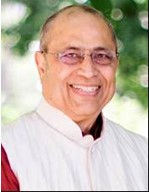By Deepak Kotwal, Pittsburgh, PA.


This is a common Hindi proverb meaning “The washerman’s dog neither belongs to the home nor the river-shore.†Even after living in the US for decades, many Indian immigrants and naturalized citizens feel they are “Indians†living here and “Americans†while visiting India.
The police killing of George Floyd, a Black man, in broad daylight by use of excess force in Minneapolis in May triggered Black Lives Matter (BLM) protests nationwide. Many whites joined, recognizing the systemic racism against African Americans. In this, where do the BROWNS — the immigrants from India — stand? Are we like the proverbial Washerman’s Dog? Since we are neither white nor black, do we feel it is not necessary to get involved? The BROWN youngsters here did not think so. For details, see Pallavi Muluk’s article on the BLM rally held in Oakland.
Indian Americans have done extremely well in the US due to their in-demand, marketable cerebral skills. Among the recent immigrant groups by country, Indian Americans have high incomes and net worth, primarily because of the skewed immigration policies of the US of letting in only people with cerebral skills. Claims that our success is due to our merit, hard work and American meritocracy are only partially true. We are the beneficiaries of two broad historical developments: a large economy and the Civil Rights struggle. We generally don’t recognize how we are benefitting from the latter.
Early English and other European arrivals to North America simply grabbed the land from the Native Americans, leading to genocide and driving the Native Americans into reservations. Slavery provided free labor of kidnapped and enslaved Africans. The concept of White Supremacy (AKA manifest destiny) was the essential intellectual underpinning.
Civil rights struggles followed. Even after the Civil War (1861-1865) ended with the Confederate States’ defeat and the abolition of slavery, Blacks were kept subjugated through Jim Crow laws, intimidation, and lynching. The Civil Rights Movement, led by Martin Luther King Jr, finally led to the 1964 Civil Rights Act. All later immigrants from India are the beneficiaries of the hard-won Civil Rights Act on housing, schooling, and employment.
One would think that the US would have welcomed immigrants in the expanding labor-short economy of the 19th and early 20th centuries. But the American attitude towards immigration was not only racist, but also anti-Catholic and anti-Jewish. It favored the Protestant White immigrants from Nordic countries. Various laws, such as the Chinese Exclusion Act, excluded Asian immigration. Naturally, in early 20th century, the number of Indians in the US was negligible. The few, mostly Sikhs from Punjab, working as laborers, faced racist attacks. An example is the 1907 Bellingham riots in Washington state to kick out Indians.
The game changer for Indians was the 1965 Immigration Act. It did away with the country-based quotas and preference for European immigrants. This act preferred immigrants with skills required for the US economy. The US was anxious to catch up technologically with the USSR after it launched Sputnik in 1957. The change was perfect for English-educated, highly skilled Indians when the Indian economy was not large enough to fully absorb them. Hence the in-flux of Indian graduate students in S&T, and doctors as residents in US hospitals after 1965.
The Civil Rights Movement and the enormously consequential 1964 Civil Rights Act made it easy for the later Asian immigrants. It integrated schools and housing, workplaces, labor unions, established the Equal Employment Opportunity Commission with its potential for lawsuits and did away with the overt Jim Crow segregation in the South.
Thus, we are the direct beneficiaries of the hard-won social changes brought about by the descendants of enslaved Blacks, without even being aware of it. So, we do need to support the continuing march by Blacks towards the eradication of racism. A few questions of self-examination are warranted here.
— What is our attitude towards African Americans? Are we unconsciously internalizing the White attitudes, thinking we are accepted here as “honorary†Whites?
— Do you know any African Americans you would call a friend?
— Do you sympathize with “colorism†in the Indian matrimonial ads? The ones where “wheatish†complexion is preferred.
— How would you feel if your son or daughter were dating/marrying an African American?
— If there is a BLM protest planned in your area, would you show up with your kids?
We owe this self-examination to ourselves, and also as a tribute to the activists who risk life and limb for progress that directly benefits us. Barrack Obama was the very first Black president — elected and then re-elected. Just remember: the choice of Kamala Harris as the VP candidate for the Democratic Party would have been impossible without the political struggle waged by the Native Blacks’ Civil Rights movement.
It is time for us to follow the lead of our youngsters:
For details, see Pallavi Muluk’s article on the BLM rally held in Oakland.
END$$
